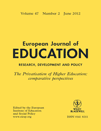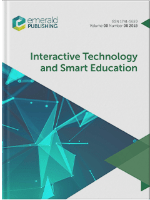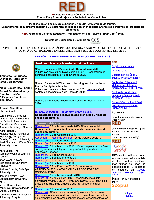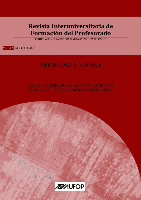
Revista Educaonline
Scope & Guideline
Innovating Pedagogy for the Digital Age
Introduction
Aims and Scopes
- Integration of Digital Technologies in Education:
The journal emphasizes the use of digital tools and technologies in educational settings, investigating their impact on learning outcomes and teaching methodologies. - Pedagogical Innovation and Active Learning:
Revista Educaonline explores innovative teaching strategies, such as gamification and active learning, to engage students and enhance their learning experiences. - Research on Teacher Training and Professional Development:
The journal addresses the training needs of educators in the digital age, focusing on their professional development and the incorporation of digital competencies in teaching. - Assessment and Evaluation in Education:
A core focus is on developing and evaluating assessment methods that align with digital learning environments, ensuring effective measurement of student progress. - Inclusivity and Accessibility in Education:
The journal promotes research on inclusive education practices, ensuring that digital learning resources are accessible to all students, including those with disabilities. - Impact of Educational Policies on Digital Learning:
Revista Educaonline analyzes the implications of educational policies and frameworks on the integration of digital technologies in various educational contexts.
Trending and Emerging
- Gamification and Game-Based Learning:
The journal has seen an increase in studies exploring the use of gamification and game-based learning strategies, emphasizing their effectiveness in enhancing student engagement and motivation. - Impact of COVID-19 on Education:
Research related to the effects of the COVID-19 pandemic on educational practices has surged, focusing on emergency remote teaching and the adaptation of digital tools in response to unprecedented challenges. - Digital Literacy and Critical Thinking:
Emerging themes include the importance of fostering digital literacy among students, equipping them with critical thinking skills necessary to navigate the digital landscape. - Use of Educational Technology for Inclusivity:
There is a growing interest in how educational technology can promote inclusivity, particularly for students with disabilities, ensuring equitable access to learning resources. - Teacher Professional Development in Digital Contexts:
An emerging focus on continuous professional development for teachers is evident, particularly regarding their ability to effectively integrate digital technologies into their teaching practices.
Declining or Waning
- Traditional Teaching Methods:
There is a noticeable decline in research focused on traditional, non-digital teaching methods, as the emphasis shifts towards innovative, technology-driven pedagogies. - General Discussions on Distance Education:
While distance education remains relevant, the journal has moved away from general discussions towards more specific investigations into the effectiveness of digital tools and methodologies. - Focus on Non-Digital Educational Resources:
Research on non-digital educational resources and methods is becoming less frequent, as the journal prioritizes studies that leverage technology for teaching and learning. - Broad Educational Research without Digital Context:
The trend towards more focused and contextualized research indicates a decline in broad educational studies that do not specifically address digital integration. - Static Assessment Techniques:
There is a waning interest in traditional static assessment techniques, with a growing preference for dynamic, technology-enhanced assessment strategies.
Similar Journals

Informatics in Education
Unlocking the Potential of Technology in Learning EnvironmentsInformatics in Education is a premier academic journal published by Vilnius University, Institute of Mathematics and Informatics, focusing on the intersection of information technology and pedagogical innovation. With an ISSN of 1648-5831 and an E-ISSN of 2335-8971, this Open Access journal has been disseminating critical research since 2003, enabling widespread accessibility and collaboration across the global educational community. The journal's commitment to advancing the field is demonstrated by its impressive 2023 Category Quartiles: Q1 in Communication and Education and Q2 in Computer Science Applications, highlighting its significant impact on these disciplines. Located in Lithuania, Informatics in Education ranks impressively in Scopus, with a Social Sciences Communication rank of #54/511 (89th percentile) and a Social Sciences Education rank of #188/1543 (87th percentile). The journal's goals include fostering research that informs pedagogical practices and enhances educational outcomes through the innovative use of technology, ensuring it remains at the forefront of research in this vital field. Researchers, professionals, and students alike will find a wealth of knowledge within its pages to support their work and learning endeavors.

Etic net-Revista Cientifica Electronica de Educacion y Comunicacion en la Sociedad del Conocimiento
Connecting Scholars to Shape the Future of LearningEtic net-Revista Cientifica Electronica de Educacion y Comunicacion en la Sociedad del Conocimiento, published by UNIV GRANADA, is a pioneering open-access journal dedicated to the exploration and dissemination of research in the fields of education and communication within the context of knowledge society. Since its inception in 2002, this journal has provided a platform for scholars, researchers, and practitioners to share innovative ideas and empirical studies, fostering critical dialogue and collaboration in the rapidly evolving landscape of digital education and communication. With its ISSN 1695-324X, Etic net aims to bridge theoretical frameworks and practical applications, contributing significantly to the scholarly discourse and practices that shape contemporary educational experiences globally. Through its commitment to open access, the journal ensures that high-quality research is freely available to all, promoting inclusivity and accessibility in academic publishing. We invite you to explore the latest findings and contribute to shaping the future of education and communication by engaging with this essential resource.

Revista Electronica de Investigacion Educativa
Transforming Educational Landscapes Through Open Access ResearchRevista Electronica de Investigacion Educativa, published by Universidad Autónoma Baja California, Inst Investigación & Desarrollo Educativo, serves as a pivotal platform in the field of education research. Established as an Open Access journal since 1999, it provides unrestricted access to a wealth of scholarly articles that contribute to the understanding and development of educational practices and policies. With a Q3 rank in the education category for 2023, it is recognized within the Scopus database, ranking #923 out of 1543 in the Social Sciences and Education sector, placing it in the 40th percentile. The journal aims to foster innovative research and interdisciplinary dialogue among educators, researchers, and policymakers, making significant strides in advancing educational methodologies and including diverse voices from the Latin American region. With coverage converging from 2006 to 2024, the Revista provides a snapshot of evolving educational trends and challenges, solidifying its role as an essential resource for those invested in educational development and research.

European Journal of Education
Innovating research for a brighter educational future.Welcome to the European Journal of Education, an esteemed publication in the field of education, published by WILEY. With an ISSN of 0141-8211 and an E-ISSN of 1465-3435, this journal is a leading source for innovative research, pedagogical theories, and effective educational practices. Based in the United Kingdom, it boasts an impressive impact factor and has secured a prestigious Q1 ranking in education for 2023, reflecting its significant contribution to the academic community. Furthermore, it ranks #322 out of 1543 in the Scopus database, placing it in the top 79th percentile of education journals. The aims and objectives of the journal include fostering interdisciplinary dialogue, advancing educational research, and informing policy decisions across Europe and beyond. Although it operates under a traditional subscription model, researchers, professionals, and students alike can access a wealth of knowledge spanning topics from educational policy to classroom innovation, thereby enhancing their academic and practical pursuits in education.

Interactive Technology and Smart Education
Empowering learning with cutting-edge technology.Interactive Technology and Smart Education is a leading academic journal published by EMERALD GROUP PUBLISHING LTD, dedicated to exploring the dynamic intersection of technology and education. With a robust impact factor signifying its significant contributions to the field, this journal consistently ranks in the Q1 quartile in categories such as Computer Science (Miscellaneous), Education, and E-learning, reflecting its prestige and wide-ranging influence. A staple for researchers, educators, and industry professionals, the journal addresses innovative practices and developments in interactive technologies that enhance teaching and learning experiences. Operating from its base in the United Kingdom, the journal spans nearly two decades of impactful publishing, featuring high-quality research that plays a crucial role in shaping the future of education through technology. Scholars seeking to stay at the forefront of this evolving field are encouraged to contribute and engage with the journal's pioneering work.

RED-Revista de Educacion a Distancia
Transforming Education with Technology-Driven ResearchRED-Revista de Educacion a Distancia is a premier open-access journal published by UNIV MURCIA in Spain, dedicated to advancing research in the fields of education and computer science applications. Since its inception in 2001, the journal has served as an essential platform for disseminating innovative research and practical applications of distance education methodologies. With an impressive impact factor and ranked in Q2 across both Computer Science Applications and Education categories as of 2023, RED is recognized for its significant contribution to the scholarly community, particularly within the Social Sciences and Engineering domains. Researchers and professionals are invited to explore cutting-edge studies that underpin pedagogical effectiveness and technological integration in educational settings. Based at the Edificio Pleiades Campus de Espinardo in Murcia, RED continues to foster an engaging dialogue among academics, providing insights that propel the field forward.

International Journal of Technology in Education
Empowering Education Through TechnologyThe International Journal of Technology in Education, published by the International Society for Technology Education & Science (ISTES), serves as a vital platform for researchers, educators, and practitioners devoted to the intersection of technology and educational practices. With an E-ISSN of 2689-2758, this journal aims to showcase innovative research, case studies, and theoretical contributions that explore how emerging technologies can enhance teaching and learning. Although specific metrics like impact factor and HIndex are currently unavailable, the journal is committed to rigorous peer review and high academic standards, ensuring that all published work contributes meaningfully to the evolving landscape of educational technology. As an open-access journal, it strives to make research widely available, fostering collaboration and knowledge sharing among its audience. Whether you are a researcher exploring new horizons or a professional seeking practical applications of technology in education, the International Journal of Technology in Education is an indispensable resource.

Pegem Egitim ve Ogretim Dergisi
Nurturing Knowledge for the Evolving ClassroomPegem Egitim ve Ogretim Dergisi is a prominent academic journal published by PEGEM AKAD YAYINCILIK EGITIM DANISMANLIK HIZMETLERI TIC LTD STI, specializing in the field of education. Based in Turkey, this journal offers a platform for scholarly discourse, catering to both emerging and established researchers in the educational domain. With its ISSN 2148-239X, the journal aims to provide insights into contemporary educational practices, pedagogical innovations, and research findings that influence teaching and learning. Although classified in the Q4 quartile of the education category as of 2022 and achieving a Scopus rank of 1178 out of 1469, it remains a valuable resource for practitioners and academics alike. The journal ceased Scopus coverage in 2023, yet it continues to be a relevant outlet for educational research in Turkey and beyond. While it operates under traditional access models, the potential for collaborative research and knowledge sharing makes it a noteworthy choice for those engaged in the evolving landscape of education.

Revista Interuniversitaria de Formacion del Profesorado-RIFOP
Inspiring the Future of Teaching Through Collaborative KnowledgeRevista Interuniversitaria de Formacion del Profesorado-RIFOP, published by the ASOC UNIV FORMACION PROFESORADO-AUFOP in Spain, is a distinguished academic journal that has been fostering the discourse around teacher education since its inception in 1987. With an established reputation for quality, the journal is indexed in prominent databases and boasts impressive rankings: it holds a Q1 rating in Cultural Studies and a Q3 rating in Education, positioning it among the leading publications in its field. With an emphasis on open access, RIFOP provides invaluable insights and research findings that are freely available to a global audience, promoting widespread dissemination and engagement among researchers, educators, and policymakers. Notable metrics include its ranking in the 81st percentile in Social Sciences - Cultural Studies and 37th percentile in Education, highlighting its relevance and impact. By creatively intersecting theory and practice, RIFOP continues to contribute significantly to the evolving landscape of teacher training and educational methodologies, making it an essential resource for anyone interested in innovative educational practices and research.

Journal of Research in Education Sciences
Championing open access to educational knowledge.Journal of Research in Education Sciences is a premier open-access journal dedicated to advancing the field of educational research. Published by NATL TAIWAN NORMAL UNIV, COLL INT STUDIES & SOCIAL SCIENCES since 2009, this journal contributes to the dissemination of knowledge in educational sciences, making significant strides in addressing contemporary educational issues. With its ISSN number 2073-753X and an established presence in Taiwan, it actively engages scholars and educators by providing a platform for rigorous peer-reviewed research. Despite its comparatively recent establishment, it holds a respectable Q3 classification in the Education category and ranks within the 26th percentile among its peers in Scopus, reflecting its growing influence in the academic community. The journal not only emphasizes innovative educational practices but also fosters discussions on policy implications and educational reforms, making it a vital resource for anyone committed to improving education systems globally. With easy access to research findings via its open-access model, the Journal of Research in Education Sciences seeks to bridge the gap between research and practice, encouraging collaboration among researchers, professionals, and students alike.